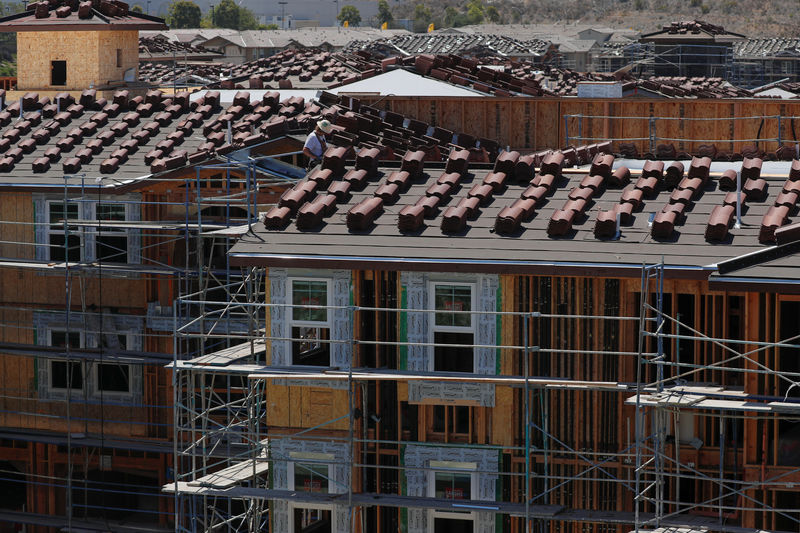By Lucia Mutikani
WASHINGTON (Reuters) - U.S. homebuilding rebounded in October and permits for future home construction jumped to a more than 12-year high, pointing to strength in the housing market amid lower mortgage rates.
The report from the Commerce Department on Tuesday also showed an increase in home completions and the stock of homes under construction, which could help to ease a supply squeeze that has plagued the housing market.
Though housing accounts for a fraction of gross domestic product, it has a bigger economic footprint. The surge in housing activity at the start of the fourth quarter suggested some support for the economy, which is slowing amid cooling consumer spending and persistent weakness in business investment and manufacturing.
"It is cheaper than ever to finance the cost of a new home and home builders are sitting up and taking notice assuming that if they build it, buyers will come," said Chris Rupkey, chief economist at MUFG in New York. "There won't be a recession if residential housing construction has anything to say about it."
Housing starts increased 3.8% to a seasonally adjusted annual rate of 1.314 million units last month, with single-family construction rising for a fifth straight month and activity in the volatile multi-family sector rebounding solidly.
Data for September was revised to show homebuilding falling to a pace of 1.266 million units, instead of decreasing to a rate of 1.256 million units as previously reported.
Economists polled by Reuters had forecast housing starts increasing to a pace of 1.320 million units in October. Housing starts advanced 8.5% on a year-on-year basis in October.
Building permits surged 5.0% to a rate of 1.461 million units in October, the highest level since May 2007. Permits were driven by the single-family housing segment, which increased 3.2% to the highest level since August 2007.
Building permits in the populous South region scaled their highest level in more than 12-1/2-years last month.
The housing market, the most sensitive sector to interest rates, has perked up in recent months, catching up to the Federal Reserve's easy monetary policy stance, which has pushed down mortgage rates from last year's multi-year highs.
The sector, which accounts for about 3.1% of the economy, however, continues to be hobbled by land and labor shortages.
A survey on Monday showed confidence among homebuilders hovering near a more than 1-1/2-year high in November. Builders, however, complained about "a lack of labor and regulatory constraints," adding that "lot shortages remain a serious problem, particularly among custom builders."
The dollar was steady against a basket of currencies, while U.S. Treasury prices rose. Stocks on Wall Street were mixed. The PHLX housing index (HGX) was trading lower.
BROAD STRENGTH
Housing starts shot up to a more than 12-year high in August. But momentum could slow as mortgage rates have backed up in the last two months, partly driven by ebbing fears of a recession amid a de-escalation in trade tensions between the United States and China.
The Fed last month cut rates for the third time this year and signaled a pause in the easing cycle that started in July when it reduced borrowing costs for the first time since 2008.
New York Federal Reserve President John Williams (NYSE:WMB) said on Tuesday he believed that the U.S. central bank had "monetary policy in the right place," and that "the economy is right where we would like it to be."
The 30-year fixed mortgage rate is currently at 3.75%, still below its peak of 4.94% in November 2018, according to data from mortgage finance agency Freddie Mac.
Residential investment rebounded in the third quarter after contracting for six straight quarters, the longest such stretch since the 2007-2009 recession.
The strong housing starts and building permit data prompted economists to lift their fourth-quarter GDP growth estimates by one-tenth of a percentage point to as high as a 1.5% annualized rate. The economy grew at a 1.9% pace in the third quarter.
Single-family homebuilding, which accounts for the largest share of the housing market, increased 2.0% to a rate of 936,000 units in October, the highest in nine months. Single-family housing starts rose in the West, Midwest and the South last month. They fell in the Northeast.
Starts for the volatile multi-family housing segment soared 8.6% to a rate of 378,000 units in October. Permits for the construction of multi-family homes increased 8.2% to a rate of 552,000 units last month.
Housing completions vaulted 10.3% to 1.256 million units last month. Realtors estimate that housing starts and completion rates need to be in a range of 1.5 million to 1.6 million units per month to close the inventory gap.
The stock of housing under construction gained 0.1% to 1.161 million units, the most since January.

"While the housing industry isn't yet building enough to satisfy demand, especially considering years of under-building since the Great Recession, if these trends continue we may return to a better housing equilibrium in the next couple years," said Robert Frick, corporate economist at Navy Federal Credit Union in Vienna, Virginia.